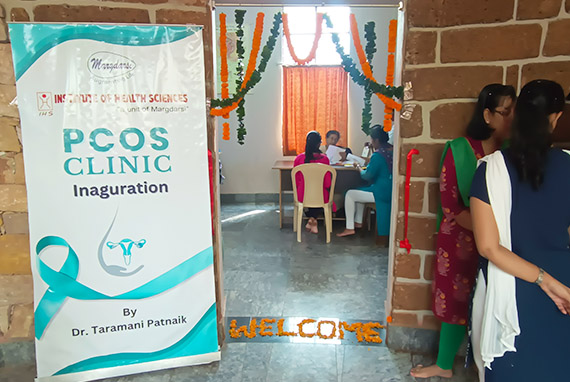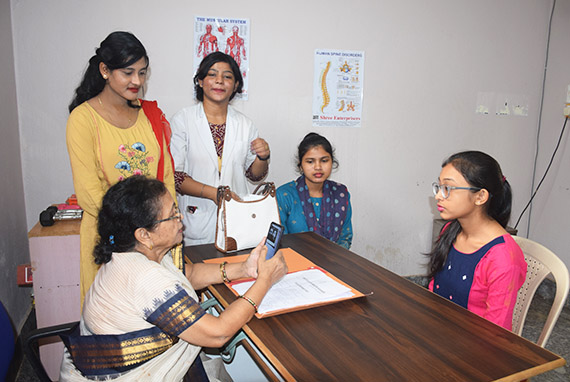The male sex chemicals androgens, which are generally present in women in small amounts, are produced excessively high levels by the ovaries in PCOS. The disorder known as polycystic ovarian syndrome is characterised by an abundance of small cysts (fluid-filled sacs) produced by the ovaries. Cysts can form in some women who do not have the illness, although not all persons who have this condition do. During ovulation, an ovary releases a developed egg. This is done in order for a male sperm to fertilise it. If the egg is not fertilised, it is ejected from the body during your period.
The hormones needed for ovulation can occasionally be produced insufficiently by a woman. When ovulation is missing, the ovaries may develop a lot of small cysts. These cysts create hormones called androgens. Women with PCOS usually have increased androgen levels. This may exacerbate a woman's menstrual cycle issues. And it has the potential to trigger several of the PCOS symptoms. Medication is a common component of PCOS treatment. Despite not treating PCOS, this can help with symptoms and even certain health problems.
What particularly causes PCOS is unknown. Patients with PCOS frequently have insulin sensitivity. This suggests that the body doesn't utilise insulin well. Greater androgen levels in the body might result from higher insulin levels. Furthermore, obesity may aggravate PCOS symptoms and raise insulin levels.
Additionally, PCOS may run in families. PCOS is usually developed in sisters or mother and daughter pairs.
If your mother or sisters have PCOS, you could be more prone to as well. If you are fat or have insulin resistance, you may also be more prone to develop it.

The symptoms of PCOS may include:
Missed periods, irregular cycles, or exceptionally light cycles.
Big ovaries or ovaries with numerous cysts.
(Hirsutism) Excessive body hair, especially on the back, stomach, and chest.
Gaining weight, especially around the abdomen.
Greasy skin or acne.
Baldness with a male pattern or thinning hair.
Infertility.
Skin tags are little bits of extra skin seen in the armpits or on the neck.
Areas of thick or dark skin behind the breasts, in the armpits, and on the back of the neck.
Both medical history and present symptoms will be considered while examination. You'll also have a physical examination. This examination evaluates the condition of your reproductive organs both inside and externally. Some PCOS symptoms are comparable to those of other disorders. You could thus be subjected to examinations like:
A computer and sound waves are used in the ultrasound exam to produce pictures of the organs, tissues, and blood arteries. This test evaluates the size of the ovaries and checks for cysts. The endometrial, the uterine lining, can also be examined during the test to determine its thickness.
In blood testing, high levels of androgens and other hormones are searched for. Your blood glucose levels could also be checked by a doctor. You could also get your cholesterol and triglyceride levels checked.
PCOS treatment depends on a number of variables. Among these include your age, the severity of your symptoms, and your general health. The type of therapy you receive may also depend on your future plans to become pregnant. If you do plan to become pregnant, you could undergo the following procedures:
A shift in diet and exercise: You can lose weight and lessen your symptoms by eating well and engaging in greater physical activity. They may help in ovulation, decreasing blood sugar levels, and improved insulin responsiveness in your body.
Ovulation-inducing drugs: The ovaries can release eggs properly with the use of medications. These drugs come with certain hazards natures as well. There might be possibility of having twins or more during pregnancy. They can also stimulate the ovaries excessively. At this point, the ovaries overproduce hormones. It may show symptoms including pelvic discomfort and bloating in the abdomen.
Pills for birth control: These aids in regulating menstrual periods, bringing down testosterone levels, and clearing up acne.
Medication for diabetes: This is frequently used to reduce insulin resistance in PCOS. Furthermore, it could help to increase more frequent ovulation, lower testosterone levels, and reduce hair growth.
Alterations to diet and exercise: You can lose weight and lessen your symptoms by eating well and engaging in greater physical activity. They might boost insulin sensitivity in your body; promote ovulation, and lower blood sugar levels.
Prescription drugs for additional symptoms: Some drugs can aid with acne or hair growth.
Certain significant health issues are more likely to affect women with PCOS Uterine cancer, high blood pressure, heart and blood vessel problems, type 2 diabetes, and high blood pressure are a few of them. Fertility issues are a common occurrence among PCOS-affected women.
After having cosmetic procedures like electrolysis and laser hair removal, you may feel more confidence in the way you appear. With your healthcare expert, go over the best ways to treat the symptoms that you are experiencing.
If you don't get your periods or they're irregular, you have acne, excessive hair growth, or weight gain; call your doctor for a diagnosis.
A computer and sound waves are used in the ultrasound exam to produce pictures of the organs, tissues, and blood arteries. This test evaluates the size of the ovaries and checks for cysts. The endometrial, the uterine lining, can also be examined during the test to determine its thickness.
In blood testing, high levels of androgens and other hormones are searched for. Your blood glucose levels could also be checked by a doctor. You could also get your cholesterol and triglyceride levels checked.
A relatively prevalent hormonal issue for women of reproductive age is PCOS.
Women who have PCOS may not ovulate, have elevated testosterone levels, and have a large number of little cysts on their ovaries.
Missed or irregular periods, excessive hair growth, acne, infertility, and weight gain are all symptoms of PCOS.
Endometrial cancer, type 2 diabetes, high blood pressure, and heart issues may all be more common in women with PCOS.
Whether or not a woman intends to become pregnant may influence the sort of PCOS therapy she receives. Women who intend to become pregnant in the future may utilise a variety of medications.

Make a list of the questions you want answered before your appointment.
Bring a companion so you can recall what your provider tells you and to ask questions.
Write down any new instructions your doctor offers you during the visit, as well as the names of any new medications, treatments, or tests.
In the event that you have a follow-up appointment, make a note of the day, time, and reason for the visit.
Understand how to get in touch with your provider if you have any questions.